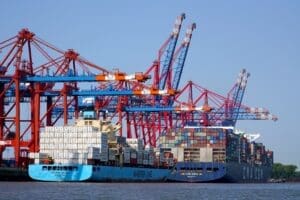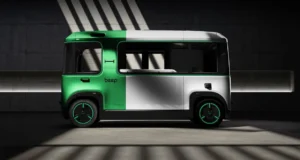 From cloud-native warehouse systems to digital twin platforms, autonomous shuttles, EV mega-deals for battery storage, and AI powered supply chain visibility, the logistics and supply chain landscape is undergoing rapid transformation. Companies like DHL, Mercedes-Benz, HOLON, ASOS, and student innovators from Bentley’s iTwin4Good Challenge are driving breakthroughs that enhance agility, resilience, and sustainability across global supply chains. This week’s stories highlight how collaboration, innovation, and digitalization are shaping the future of mobility, infrastructure, and commerce.
From cloud-native warehouse systems to digital twin platforms, autonomous shuttles, EV mega-deals for battery storage, and AI powered supply chain visibility, the logistics and supply chain landscape is undergoing rapid transformation. Companies like DHL, Mercedes-Benz, HOLON, ASOS, and student innovators from Bentley’s iTwin4Good Challenge are driving breakthroughs that enhance agility, resilience, and sustainability across global supply chains. This week’s stories highlight how collaboration, innovation, and digitalization are shaping the future of mobility, infrastructure, and commerce.
This week in news:
Manhattan Associates and DHL Customer Casestory
![]() DHL has partnered with Manhattan Associates to implement Manhattan Active® Warehouse Management (WM), a cloud-native, versionless warehouse management system. This initiative is part of DHL’s broader cloud-first strategy aimed at enhancing agility and scalability across its global supply chain operations. By transitioning from legacy on-premise systems, DHL seeks to eliminate the challenges of frequent software upgrades and embrace a more flexible infrastructure. Manhattan Active WM, built entirely on microservices, unifies distribution operations and enables control over demand, supply, labor, and automation across DHL’s extensive network. The system has already been integrated across multiple DHL sites, allowing for rapid deployment of new features and ensuring that both DHL and its customers benefit from the latest capabilities. The partnership is expected to expand to hundreds of sites in the coming years. Markus Voss, DHL’s CIO and COO of Supply Chain, emphasized that going versionless and leveraging cloud-based software will be a transformative step for the company.
DHL has partnered with Manhattan Associates to implement Manhattan Active® Warehouse Management (WM), a cloud-native, versionless warehouse management system. This initiative is part of DHL’s broader cloud-first strategy aimed at enhancing agility and scalability across its global supply chain operations. By transitioning from legacy on-premise systems, DHL seeks to eliminate the challenges of frequent software upgrades and embrace a more flexible infrastructure. Manhattan Active WM, built entirely on microservices, unifies distribution operations and enables control over demand, supply, labor, and automation across DHL’s extensive network. The system has already been integrated across multiple DHL sites, allowing for rapid deployment of new features and ensuring that both DHL and its customers benefit from the latest capabilities. The partnership is expected to expand to hundreds of sites in the coming years. Markus Voss, DHL’s CIO and COO of Supply Chain, emphasized that going versionless and leveraging cloud-based software will be a transformative step for the company.
Bentley, Enactus, and SiTESalvage Digital Twin-Powered Platform for Repurposing Demolition Materials
 Bentley Systems and Enactus have announced the winners of the 2025 iTwin4Good Challenge, a global competition that empowers university students to apply digital twin technology to sustainability challenges. The winning team, SiTESalvage from the UK & Ireland, developed a platform that uses digital twins to repurpose demolition materials, helping divert waste from landfills and reduce the environmental impact of construction. Runners-up included Basola from Germany, who created a solar-powered reactor to convert plastic waste into fuel, and EcoTwins from Canada, who proposed using abandoned gold mines for renewable energy projects. These innovations showcase how digital tools and entrepreneurial thinking can drive sustainable transformation in supply chains and infrastructure.
Bentley Systems and Enactus have announced the winners of the 2025 iTwin4Good Challenge, a global competition that empowers university students to apply digital twin technology to sustainability challenges. The winning team, SiTESalvage from the UK & Ireland, developed a platform that uses digital twins to repurpose demolition materials, helping divert waste from landfills and reduce the environmental impact of construction. Runners-up included Basola from Germany, who created a solar-powered reactor to convert plastic waste into fuel, and EcoTwins from Canada, who proposed using abandoned gold mines for renewable energy projects. These innovations showcase how digital tools and entrepreneurial thinking can drive sustainable transformation in supply chains and infrastructure.
HOLON Establishes Autonomous Shuttle Manufacturing Facility in Jacksonville
 HOLON, a subsidiary of the BENTELER Group, is launching its first U.S. manufacturing facility for autonomous electric shuttles in Jacksonville, Florida, marking a major milestone in sustainable mobility and supply chain innovation. The 500,000-square-foot plant, expected to be completed by early 2026, will produce 5,000 autonomous movers annually and create up to 150 jobs by 2027. Designed for public road use, HOLON’s mover meets federal safety standards and supports diverse transit applications. This initiative positions Jacksonville as a national hub for autonomous vehicle production and reflects a broader shift toward localized, high-tech manufacturing in the supply chain ecosystem.
HOLON, a subsidiary of the BENTELER Group, is launching its first U.S. manufacturing facility for autonomous electric shuttles in Jacksonville, Florida, marking a major milestone in sustainable mobility and supply chain innovation. The 500,000-square-foot plant, expected to be completed by early 2026, will produce 5,000 autonomous movers annually and create up to 150 jobs by 2027. Designed for public road use, HOLON’s mover meets federal safety standards and supports diverse transit applications. This initiative positions Jacksonville as a national hub for autonomous vehicle production and reflects a broader shift toward localized, high-tech manufacturing in the supply chain ecosystem.
Mercedes-Benz, LG Strike $11B EV Battery Supply Deal
 LG Energy Solution has signed two major multi-year battery supply agreements with Mercedes-Benz worth an estimated \$11 billion, covering both the EU and U.S. markets. The contracts total 107 gigawatt hours of cylindrical 46-series battery cells—32 GWh for Europe and 75 GWh for the U.S.—with the EU deal running through 2035 and the U.S. contract starting in 2029 and ending in 2037. These deals mark LG’s largest order to date and reflect the growing urgency among automakers to secure reliable EV battery supply chains amid global efforts to electrify and challenges from tariffs. LG is also expanding its U.S. manufacturing footprint with new plants in Arizona and Michigan, aiming to become North America’s top battery supplier by 2030.
LG Energy Solution has signed two major multi-year battery supply agreements with Mercedes-Benz worth an estimated \$11 billion, covering both the EU and U.S. markets. The contracts total 107 gigawatt hours of cylindrical 46-series battery cells—32 GWh for Europe and 75 GWh for the U.S.—with the EU deal running through 2035 and the U.S. contract starting in 2029 and ending in 2037. These deals mark LG’s largest order to date and reflect the growing urgency among automakers to secure reliable EV battery supply chains amid global efforts to electrify and challenges from tariffs. LG is also expanding its U.S. manufacturing footprint with new plants in Arizona and Michigan, aiming to become North America’s top battery supplier by 2030.
ASOS Targets Supply Chain Visibility Upgrade
 ASOS is enhancing its supply chain transparency by partnering with TrusTrace, an AI-powered traceability platform, to achieve real-time visibility down to Tier 5—the farm level. This move supports compliance with global regulations and strengthens risk and impact management through centralized documentation and configurable analytics. The initiative reflects Asos’s broader strategy to boost resilience and sustainability across its operations, amid industry pressures like shifting trade policies and demands for labor and emissions transparency. Complementing this, Asos is also integrating Celonis Process Intelligence to optimize logistics and fulfillment, with plans to expand its use across other business functions.
ASOS is enhancing its supply chain transparency by partnering with TrusTrace, an AI-powered traceability platform, to achieve real-time visibility down to Tier 5—the farm level. This move supports compliance with global regulations and strengthens risk and impact management through centralized documentation and configurable analytics. The initiative reflects Asos’s broader strategy to boost resilience and sustainability across its operations, amid industry pressures like shifting trade policies and demands for labor and emissions transparency. Complementing this, Asos is also integrating Celonis Process Intelligence to optimize logistics and fulfillment, with plans to expand its use across other business functions.
















